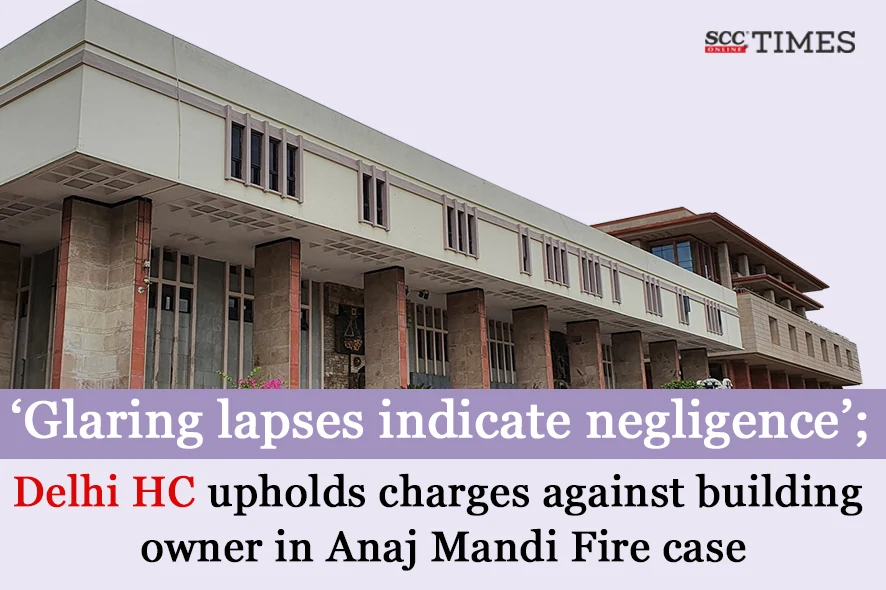Delhi High Court: The present petition was filed to assail the order dated 12-9-2024 (‘impugned order’) passed by the Additional Sessions Judge, Tis Hazari Courts, Delhi (‘Sessions Court’), for offences punishable under Sections 304/308 of the Penal Code, 1860 (‘IPC’). By way of the impugned order, the Sessions Court framed charges against the petitioner-accused for offence under Sections 304 (Part II)/308/35/36 IPC, and alternatively, under Sections 304-A/337/338/35/36 IPC. A Single Judge Bench of Dr. Swarana Kanta Sharma, J., opined that the petitioner’s daily presence at the building, ownership of other floors, his role in sub-letting portions of the premises for earning money, lack of safety mechanisms and not rectifying the defects in the building despite a prior incident of fire, all point to his active participation in committing acts which led to the unfortunate incidents in question. Thus, the Court dismissed the petition stating that the material on record disclosed a prima facie case against the petitioner.
Background:
A massive fire broke out in the densely populated Anaj Mandi area of Sadar Bazar, Delhi on 8-12-2019, claiming the lives of 45 people. Most of the victims were labourers who had been asleep, unaware of the impending catastrophe. The incident led to an investigation into the circumstances that allowed such a disaster to occur. The petitioner was mentioned as one of the accused in the FIR and thus, had challenged the Sessions Court’s order, which framed charges against him under Sections 304 (Part II)/308/35/36 IPC and alternatively under Sections 304-A/337/338/35/36 IPC. The petitioner sought discharge on the ground that he neither owned nor controlled the building’s floor where the short circuit, allegedly causing the fire, occurred, which ultimately had triggered the fire resulting in the loss of lives.
Case Analysis and Decision:
The issue before the Court was “whether the petitioner’s plea for discharge was merited, at the stage of framing of charge?”. The Court relied on Manendra Prasad Tiwari v. Amit Kumar Tiwari, 2022 SCC OnLine SC 1057 and observed that the central test to be applied while framing a charge was whether there existed sufficient material on record which, if unrebutted and accepted at face value, gave rise to a strong suspicion that the accused had committed the offence in question.
The Court noted that as per the admitted position and the findings during investigation, the petitioner was the owner of a portion of the building in question, which was constructed upto five floors, although permission was given only for height of 15 metres. These structures, being unauthorised and illegal, reflected clear violation of norms under Delhi Master Plan—2021 for Special Area Zones. Moreover, being the owner of the ground floor portion of the building, the petitioner was under a heightened duty of care, since in the eventuality of any fire or emergency, the occupants of upper floors would be compelled to rush down to the ground floor through the common staircase to escape. The investigation brought out that the common staircase remained majorly blocked throughout with stored material (which included inflammable material), compromising the escape route and thereby putting lives in grave danger. The Court thus opined that such circumstances could not be brushed aside or ignored.
The investigation further revealed that the electric wiring of the entire building was in a dilapidated and poorly maintained condition. The mere fact that the short circuit, which allegedly caused the fire, occurred on the second floor could not absolve the petitioner in this case. The dangerous and neglected condition of the electric wiring throughout the premises contributed to the overall risk and could not be compartmentalized floor-wise. The investigation also revealed complete absence of any fire-fighting equipment or safety mechanisms on the portions also owned by the petitioner. Such glaring lapses, viewed cumulatively, indicated not just negligence but reckless disregard for the safety of occupants of the building. The culpable knowledge attributable to him satisfie the ingredients of Section 299 of IPC, and justified the framing of charge under Section 304 (Part II) of IPC; and similarly, for offence under Section 308 of IPC, read with Section 35 and 36 of IPC.
The plea of innocence taken by the petitioner, or his attempt to distance himself from the unfortunate incident, was unmerited. Further, the documents relied upon by him to deny ownership did not rebut prima facie material, and issues of ownership were matters for trial. Even if it was accepted that the petitioner did not cause the fire and he was not the owner of the floor on which the short circuit took place, the material on record prima facie indicated that he had the requisite knowledge of the dangerous condition of the premises and its likely consequences.
The Sessions Court had also rightly framed alternate charges under Sections 304-A of IPC and Sections 337 and 338 IPC in the facts and circumstances of the case. The petitioner’s daily presence at the building (which was constructed unauthorizedly), ownership of other floors, his role in sub-letting portions of the premises for earning money, and not rectifying the defects in the building despite a prior incident of fire, all pointed to his active participation, and sharing responsibilities, with the co-accused persons in committing acts which led to the unfortunate incidents in question.
The Court opined that the impugned order passed by the Sessions Court did not suffer from any legal infirmity since the material on record disclosed a prima facie case against the petitioner. His presence, ownership, rental arrangements, and failure to act on safety risks demonstrated active participation and shared responsibility.
The Court found no infirmity in the Sessions Court’s order framing charges under Sections 304 (Part II), 308, 304-A, 337, 338, read with Sections 35 and 36 IPC, and dismissed the petition as devoid of merit.
[Mohd. Imran v. State (NCT of Delhi), 2025 SCC OnLine Del 5190, decided on 4-8-2025]
Advocates who appeared in this case:
For the Petitioner: Shamim A. Khan, Advocate.
For the Respondent: Naresh Kumar Chahar, APP for the State, with Inspector Vinay








